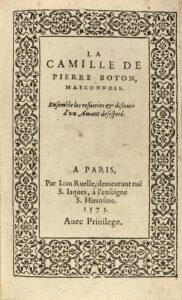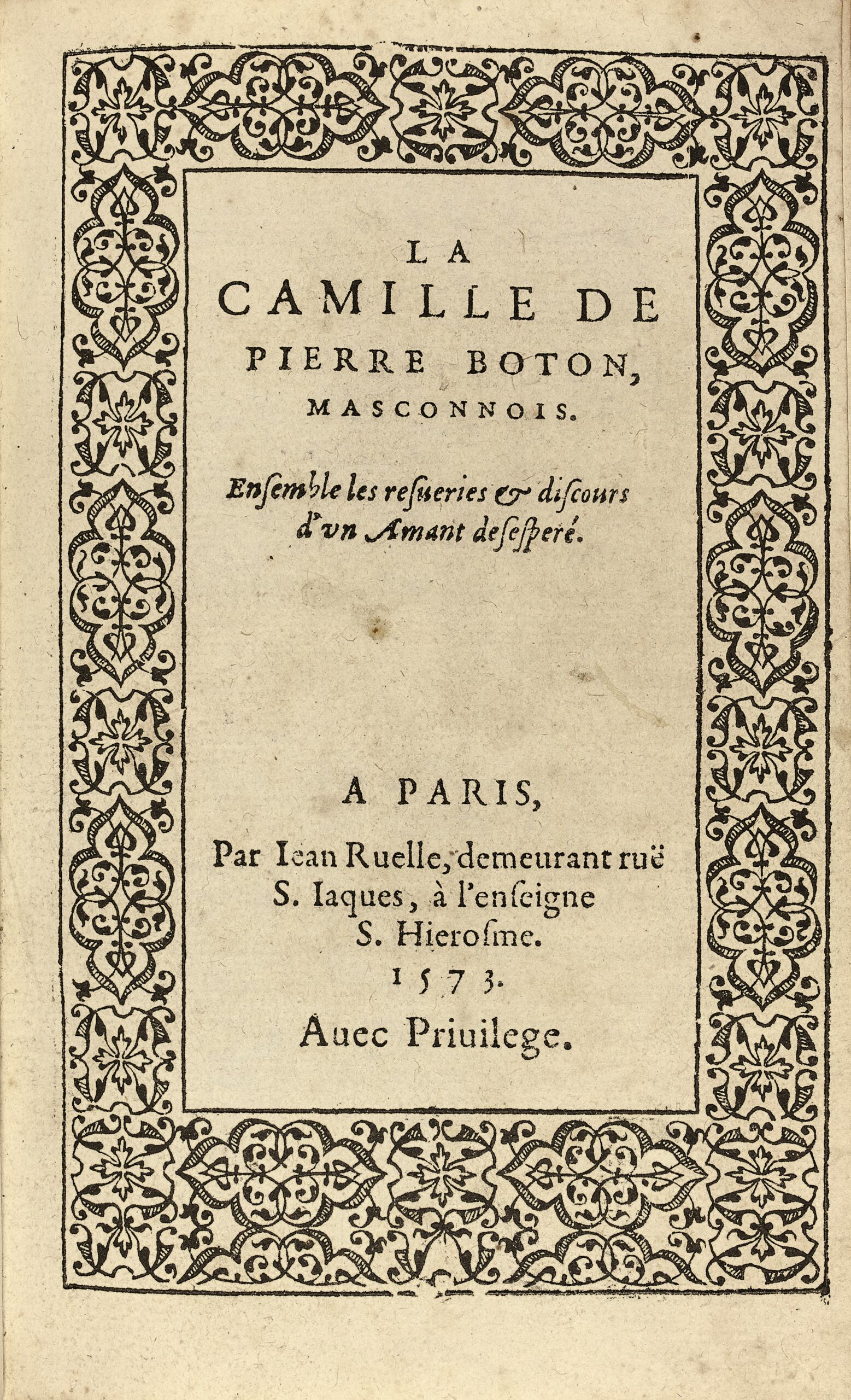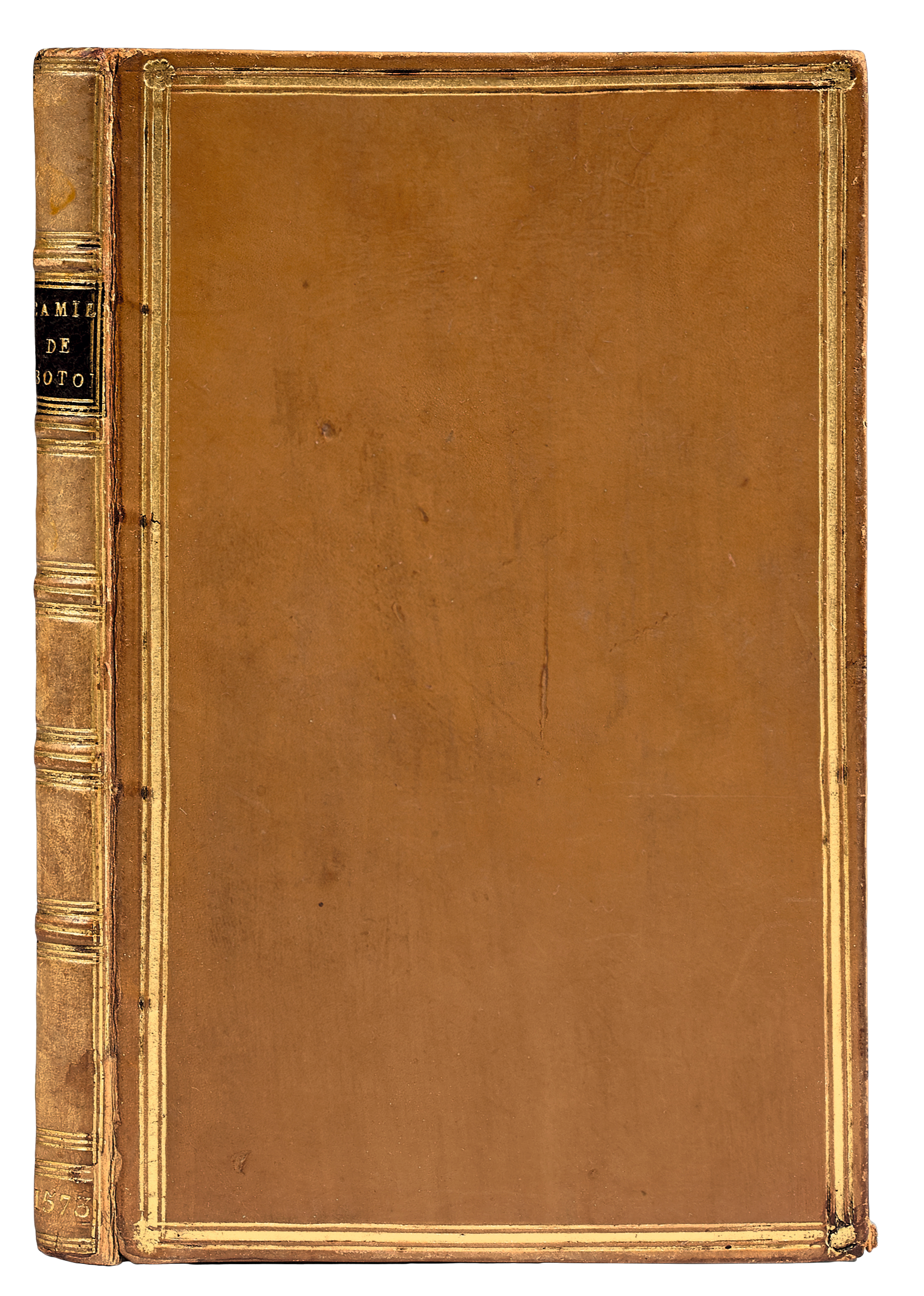A Paris, par Jean Ruelle,1573.
8vo of (8) ll., 63, (1) l., title in a woodcut framing. Clear stain p. 37, l. 53 cut short and atteining the headline. Blond glazed calf, triple gilt fillet around the covers, spine ribbed and decorated with gilt fillets, lettering pieces in black morocco, gilt edges. Binding from the beginning of the 19th century.
153 x 96 mm.
Unique first edition, perfectly preserved, of this novelistic and poetic collection of the utmost rarity.
The most recent judgment and one of the most authorized, that of Marcel Raymond, places Pierre BOTON (1555-1618) among the best poets of the French province of his time.
This work attests of the great vivacity of poets of province, at the end of Charles IX’s reign.
“Born in Mâcon around 1555, lawyer in this city and partisan of the League at the end of the wars of religion, he was a deputy for the Duke of Mayenne, then in Dijon, in July 1587. After the abjuration of Henry IV he passed to the royal party and was appointed President in the election of Mâcon. He served, upon this title, on the states of Mâconnais and was delegated by those to the states of Burgundy from 1599 to 1622. He died at 63 “
(P. Vauxelles, Dictionnaire de biographie française. The previous biographies mention him dead in 1598, which is the date of hist last known work).
Viollet-le-Duc, first of all, timidly began to emphasize Pierre Boton’s Camille (in his“Bibliothèque poétique”, 1843), despite the opinion of his predecessors.
“We have no information on Pierre Boton other than that which he gives of himself in his poems; that is, he was very young when he composed them, notwithstanding the advice he received from all quarters to devote himself to more fruitful work. This advice, impotent as always, aroused his anger, which he bitterly exhales in a prose epistle addressed to the reader, as appears to have been the custom at the time, following the example of Etienne Forcadel; but Boton is more violent [… ] Unfortunately, we have no newspapers from this period, and I am unable to ascertain the effect this epistle had on the minds of the critics of the time; but biographers, and in particular Abbé Goujet, severely reproach Boton for his haughtiness and airs of contempt, which, they add, suit him less than anyone else ; which I deny, without approving Boton’s insults; but certainly his talent, and he has it, is not inferior to that of most of his contemporaries”.
The judgment given by Bishop Goujet (“Bibliothèque françoise…”, 1740-1756) on the Camille, and on Pierre Boton, was conditioned by moral considerations, and the annoyance that could have produced on this austere Jansenist priest from the 18th century, the violent Epitre au lecteur of a young and fiery poet decided to make himself known, despite the advices of caution formulated by his entourage.
By the specialists’ admission, the work is permeated by a fervour, a conviction and a remarkable authenticity that make all of its charm.
Copy in perfect condition, preserved in its elegant blond glazed calf binding.
Bibliography: Barbier, Ma bibliothèque poétique, 4th part, tome I, Geneva, 1998; Brunet, I, 1143; Suppl., I, 157; Raymond, L’Influence de Ronsard sur la poésie française, P., 1927, Geneva, 1993; Viollet-le-Duc, Catalogue des livres composant la bibliothèque poétique de M. Viollet Le Duc… Paris, 1843; cat. Herpin, n°168, “very rare collection



